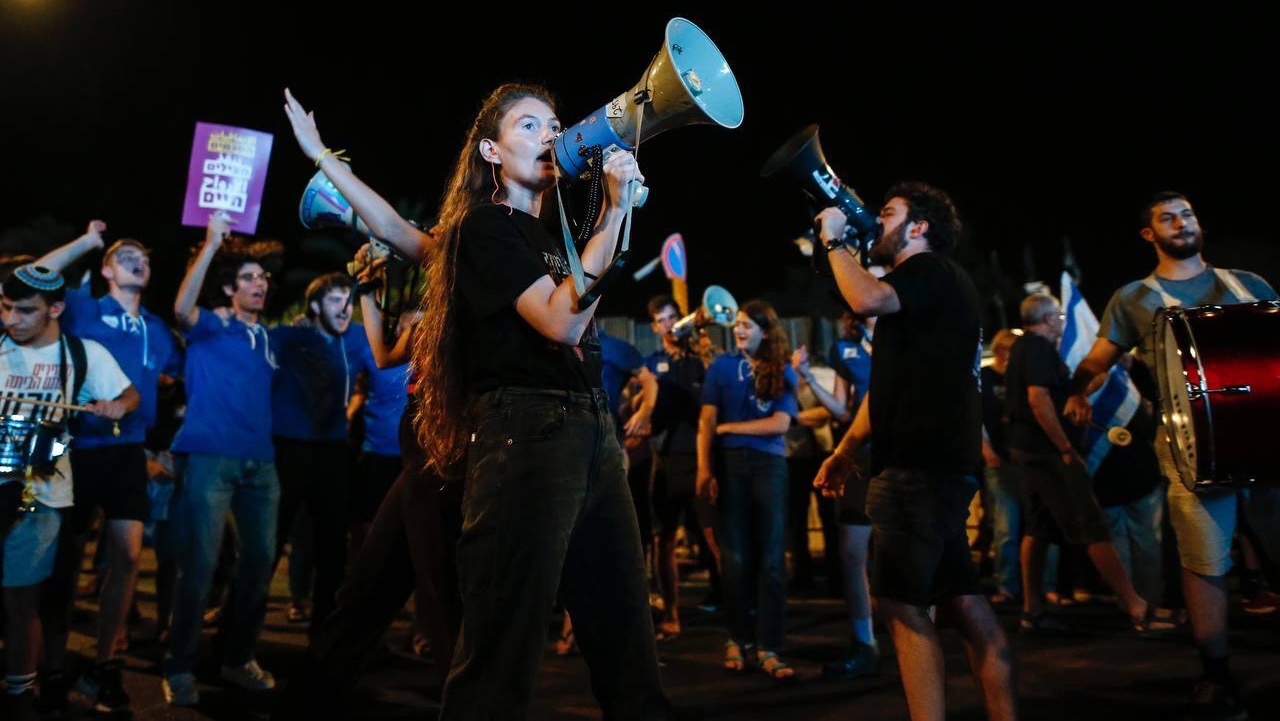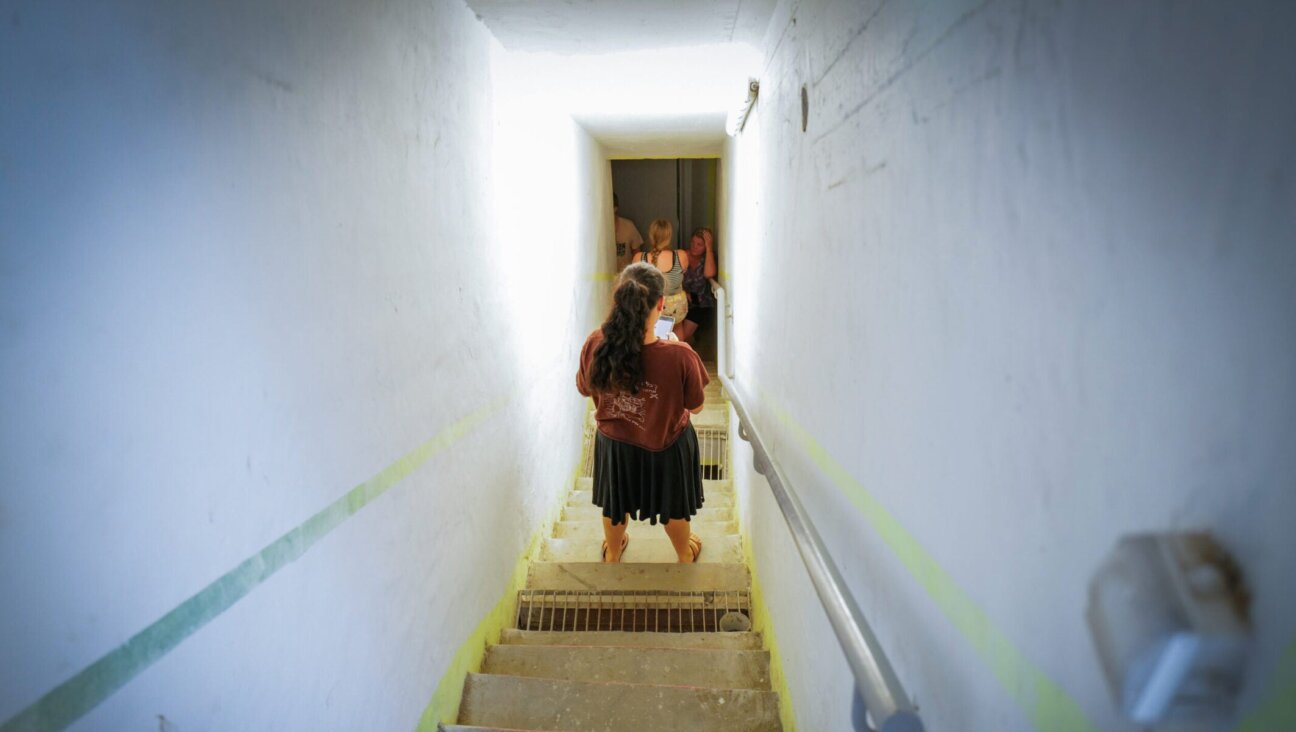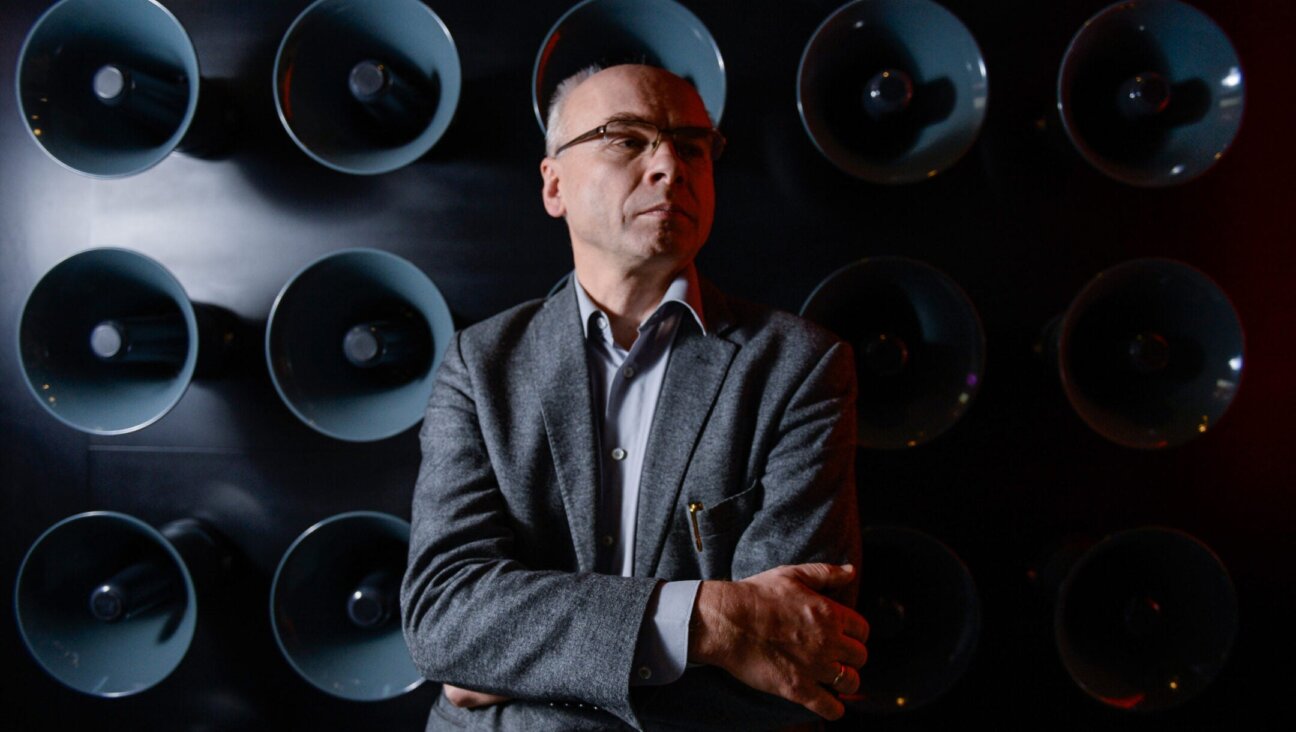Netanyahu apologizes for the first time to a hostage family, blames Hamas for captives’ deaths
Netanyahu’s apology calls to families of six hostages killed in Gaza come amid swelling protests and grief across Israel

Israelis protest demanding a ceasefire and a deal to release hostages outside the home of Prime Minister Benjamin Netanyahu, Jerusalem, Aug. 31, 2024. (Saeed Qaq/Anadolu via Getty Images)
(JTA) — Israeli Prime Minister Benjamin Netanyahu apologized for not freeing hostages as Israel woke up to the shattering news that Hamas terrorists murdered six captives who were on the verge of being rescued.
Some of those killed had been slated for release under a failed deal in July, an anonymous Israeli official told the Israeli news outlet Ynet.
Netanyahu’s apology, delivered Sunday to the parents of one of the six, Alex Lubnov, was a first for the prime minister who until now has said that accountability should come after Hamas is defeated in the war it launched with mass killings and abductions. He had previously apologized only that Oct. 7 had happened, and only in response to a question in English-language media.
“The prime minister expressed deep regret, and apologized to the family, that the State of Israel did not succeed in returning Alexander and the other five hostages alive,” his office said in a statement.
“I would like to tell you how much I regret and request forgiveness for not succeeding in bringing Sasha back alive,” the statement quoted Netanyahu as telling Oxana and Grigory Lubnov.
The statement said that Netanyahu would reach out to the other five families. Two of them have reportedly declined to take his call.
The apology tour was a sign that Netanyahu understands the depth of public anger over the hostages’ deaths and over his failure to end the war and bring home the more than 100 hostages still held by Hamas. The Hostage Families Forum, which promised a “quake” in Israel minutes after the revelation after 11 p.m. Saturday that the army had recovered bodies, had by Sunday morning planned rallies in Jerusalem, Tel Aviv and New York.
In a statement Sunday morning mourning the dead, the group blamed the hostages’ deaths on “delays, sabotage and excuses,” an allusion to reports that Netanyahu has moved the goalposts in the U.S.-brokered efforts to bring about a ceasefire deal that would release the remaining hostages.
“A deal for the return of the hostages has been on the table for over two months,” the statement said. “Were it not for the delays, sabotage, and excuses those whose deaths we learned about this morning would likely still be alive. It’s time to bring our hostages home — the living for rehabilitation, and the fallen and murdered for burial in their homelands.”
The deal appears to be held up in part over Netanyahu’s insistence that the army maintains a substantive presence on the Egypt-Gaza border, in an area known as the Philadelphi corridor. Hamas — whose shifting demands have also frustrated a deal — wants the troops removed. Israel’s defense establishment, led by defense minister Yoav Gallant, believes Israel can move the troops and still secure the area.
Netanyahu took a harsh stance against Hamas in a separate video statement posted on social media on Sunday. “Whoever murders hostages — does not want a deal,” he said.
To Hamas, Netanyahu said, “We will not rest and we will not be silent. We will pursue you, we will catch up with you and we will settle accounts with you.”
Gallant, meantime, called for a government vote on the proposal to move the troops from the border. “The cabinet must gather immediately and reverse the decision made on Thursday,” he said in his own statement, referring to a decision last week that culminated in a much reported shouting match between him and Netanyahu. “It is too late for the hostages who were murdered in cold blood. We must bring back the hostages that are still being held by Hamas.”
Newscasters on the state-run broadcaster, Kan, were so taken aback by Netanyahu’s apology that one opened the news hour after the prime minister’s office put out the release by quoting Elton John’s song “Sorry Seems to be the Hardest Word.”
Carmela Menashe, who has for decades been Kan’s military reporter, contrasted Netanyahu’s apology, nearly 11 months into the crisis, with the late Prime Minister Yitzhak Rabin, who in 1994 immediately called a press conference after a botched raid to rescue Nachshon Waxman, a soldier held by Hamas. The radio ran tape of Rabin’s apology. Netanyahu is known to chafe at comparisons with the prime minister who was assassinated in 1975 by a Jewish extremist.
The shock for Israelis was sharpened because some of the dead hostages, who were reported to have been shot in the head just as Israeli troops were closing in on where they were held in a tunnel in the border city of Rafah, had become the faces of Israeli anguish. The dramatic stories of their capture, and the heroism of some as they resisted the terrorists and endured confinement, are part of the lore of the deadliest attack in Israeli history.
Among them was Hersh Goldberg-Polin, 23, an Israeli American who lost his arm during the Oct. 7 raids and who was filmed being taken away in a pickup truck. He appeared in a video Hamas released in April. His parents, Rachel Goldberg and Jon Polin, brought the Democratic National Convention to a standstill last month when they appealed for a deal to release the hostages.
Three of the hostages killed — Goldberg-Polin, Eden Yerushalmi and Carmel Gat — had been on a list of those who would have been released under the terms of a July 2 ceasefire proposal, according to the Ynet report. The proposal faltered and soon after, U.S. President Joe Biden issued rare open criticism against Israel over its efforts to reach a deal.
Also Sunday, a gunman shot dead three Israeli policemen at a checkpoint near Hebron in the West Bank and was later killed by Israeli forces. Clashes between Israeli troops and Hamas-backed militants have intensified in the West Bank in recent days. One of the police officers killed had a daughter who died on Oct. 7 while defending the police station where she worked from Hamas terrorists.















